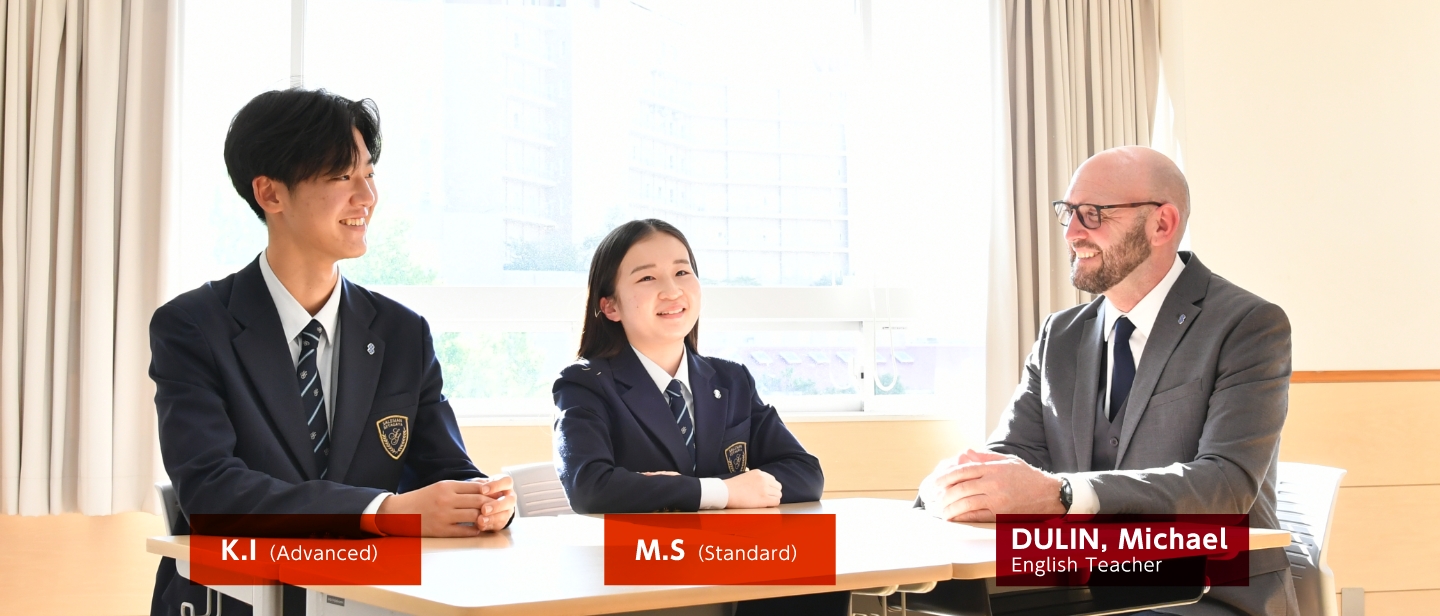インターナショナルクラス
INTERNATIONAL CLASS
ROUND-TABLE DISCUSSION
インターナショナルクラス座談会
Beyond Borders: Your Future
Through Overseas Universities

Aspiring to broaden their horizons at universities overseas, what unique learning paths are our students experiencing here at Salesian International School Setagaya? Read the interview with M.S and K.I, both in their third year of junior high school, to gain insights into their global futures and their perspectives on studying abroad. M.S shares her experiences in the International Class's "Standard" course (where English is the language of instruction for English classes), while K.I discusses his learning in the "Advanced" course (where English is used across English, Math, Science, and Social Studies).
Additionally, we spoke with Michael Dulin, an English teacher, to learn more about the school's educational approach aimed at preparing students for overseas studies.
― What motivates you to pursue higher education overseas?
K.I : I want to study abroad because I am interested in other countries and their culture. I lived in London for seven years and really enjoyed it. Life and culture there are very different when compared to Japan.
M.S : I want to go and live overseas because I like the different atmosphere there.
― Intending to attend a university abroad, how are you preparing here at Salesian?
K.I : To me, university is still a bit away, as I am still in the third year at a junior high school, but I'm trying to do my best in as many subjects as possible.
M.S : I'm particularly studying English because I just started learning English in junior high school here. I want to continue studying for future studies.
― You already speak quite well.
M.S : Thank you.
Michael Dulin (Teacher) : At Salesian, we invite university ambassadors to the school for a seminar to prepare students for the possibility of studying overseas. Allowing students to get information directly or expEmc_Kowa_5855erience it themselves shows them what the university will be like. Then, all of a sudden, they might realize that there is an interest in the world outside of Japan.
K.I : Yes, I like that. We can understand other people's cultures and things that we don't know about.
― Mr Dulin, could you outline some important characteristics of applying to universities overseas?
M.D : It's not just about a test anymore. In the United States, for example, everyone is a good student for good schools – that's the basic level. So, you can't compete on academics alone.
You have to start thinking about who you are as a whole person. Imagine a job interview. Your personal story in the application is crucial. Consider a challenging time you've faced and how you got through it. Those are the essays you'll write. You have to be really honest in them because it comes from experience with yourself and knowing yourself before you step out of the school.
― What are you interested in learning or majoring in at a university abroad?
M.S : As I like math and science, I want to study medicine or business.
M.D : If you want to study medicine, it's great to focus now. You can start looking for ways to get involved with the field from here on. You can find volunteer opportunities at hospitals, right?
M.S : Yeah, I can prepare for that!
M.D : So, the better you understand your real interests and what fits you, the more honestly your application speaks about you, and that's how you see yourself belonging there.
― With this in mind, what do you think are the strengths or key aspects of learning at Salesian?
K.I : I think one of the strengths of Salesian is the PBL.
M.S : I agree. There is no such learning outside the school.
― Could you please explain PBL, Mr Dulin?
M.D : In Problem Based Learning, or PBL, students work together on a common problem, sharing ideas and perspectives. This method places a strong emphasis on significantly developing their "LOGICAL," "CRITICAL," and "CREATIVE" thinking skills. It's very time-based, both in discussion and writing. Within about a 20-minute window, they produce a 5-paragraph essay.
K.I : Long essays are particularly difficult, but I understand that writing essays will be an advantage. I'm preparing for my future by challenging this.
M.S : Yeah, I think it isn’t easy, but I am sure this helps me a lot.
― The students really understand that PBL is tough, but also very important.
M.D : Yes. We're putting out challenges – open-ended questions. Then, students become the new creators of knowledge.
It's like they are figuring out how to develop it themselves. And in doing so, the next part is about making themselves leaders. Making it so you can come to their own conclusions without having other people tell you what they are.
Having that kind of strong trait, especially before stepping out into an international world, is going to be a huge benefit. That's where, especially within our school, we've realized that so much has happened, not just because I'm focused on English classes, but because we align everything throughout every single class, and then every single year is kind of built with connectedness.

